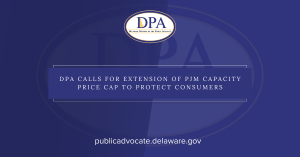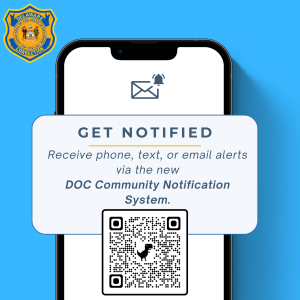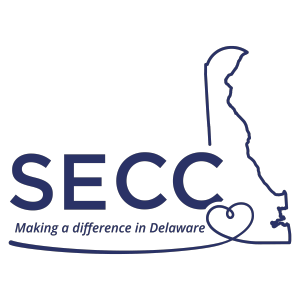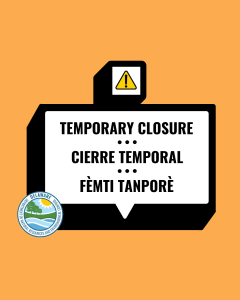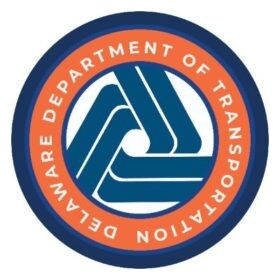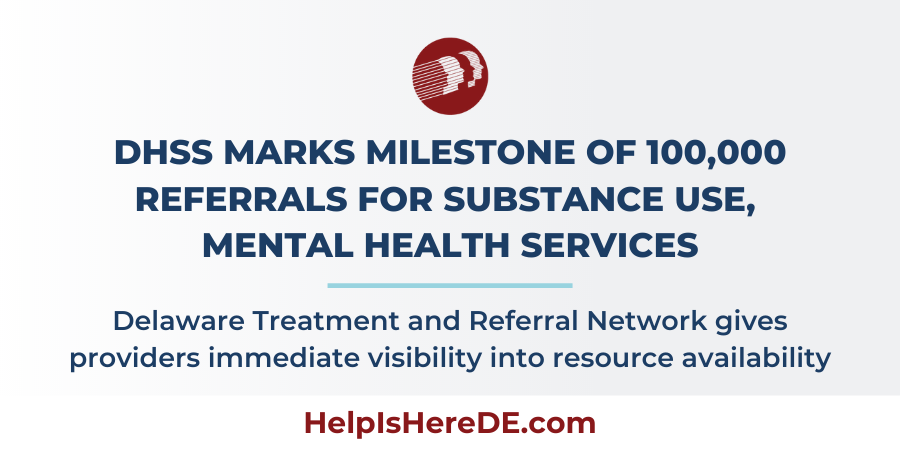
NEW CASTLE (Jan. 4, 2022) – The Department of Health and Social Services’ (DHSS) Division of Substance Use and Mental Health (DSAMH) has surpassed a milestone of 100,000 referrals through its Delaware Treatment and Referral Network (DTRN), a system for Delawareans seeking substance use and mental health services.
Delaware is the first state to make more than 100,000 referrals using this system, built on the OpenBeds® platform, a bed registry platform owned by Bamboo Health (formerly Appriss Health + PatientPing). The DTRN system identifies and tracks behavioral health and social determinants of health resources throughout the state, giving providers immediate visibility into resource availability across a shared network. This makes it easier to get people the help they need when they need it.
“One death from an opioid overdose or from a mental health crisis is one too many,” said Lt. Governor Bethany Hall-Long, Ph.D., RN. “For families coping with a loved one, who suffers from substance use disorder or mental illness, finding help is an immediate need that must be met. The 100,000 referrals through DTRN demonstrates that we are mending the fractured behavioral health system in Delaware, so people can get access to treatment and on the path to recovery. As Chair of Delaware’s Behavioral Health Consortium, we remain committed to saving lives through platforms like DTRN and the network of behavioral health providers. Newsweek recently recognized Delaware in November 2021 as one of only four states that the CDC reported as having a decrease in the annual percentage rate of opioid deaths. DTRN was a significant tool contributing to this reduction.”
“This milestone represents a systematic improvement in identifying and treating individuals with substance use disorders,” said Joanna Champney, Director of the Division of Substance Abuse and Mental Health. “That is 100,000 times where a pathway to treatment was made available for someone so they didn’t have to end up in the emergency room or worse.”
The Division of Substance Abuse and Mental Health launched DTRN in October 2018 as a way to improve outcomes for Delawareans suffering from a substance use disorder, while coordinating support for accompanying needs for housing, employment, education and other wraparound services. A recent white paper summarizing first-year results showed that the cloud-based network for expedited client referrals to inpatient and residential behavioral health programs generated a 45% increase in treatment referral requests in its first year, while improving rapid acknowledgment of referrals by 25%.
“Open Beds has been a fantastic platform that has provided transparency like never before,” said Steve Beltran, MSN, an RN Nurse Manager for ChristianaCare. “It has allowed us to place our patients in the right level of care faster. And has proven to be an effective method to communicate with care providers and agencies across the state.”
Overdose deaths continue to rise in Delaware, reaching 447 in 2020 (up from 431 in 2019 and 401 in 2018). Of those 447 deaths, 372 (83%) involved the use of fentanyl, a powerful synthetic opioid that is 50-100 times more potent than morphine.
The state’s opioid prescribing rate in 2020 of 45.2 per 100 people is higher than the U.S. average of 43.3, according to data from the Centers for Disease Control and Prevention (CDC).
Lack of visibility for providers in determining current inpatient and residential treatment center capacity can make it challenging to connect clients with appropriate substance use and behavioral health services in a timely manner. Referring physicians and treatment providers often struggle to share client data, admission criteria, and availability. For clients in need, these delays can be dangerous and even life-threatening.
By assisting providers with the onboarding process to encourage adoption of the Delaware Treatment and Referral Network, Delaware expanded the number of active users on its network by 264% in its first year. The referral platform also improved response rates to referral requests, with 65% of receiving organizations acknowledging a client referral within 30 minutes, an increase of 25% since the program’s inception a year prior.
“DTRN has been pivotal in connecting individuals with behavioral health and substance use issues with appropriate providers in an efficient and collaborative manner,” said John McKenna, CEO of Rockford Center. “This technology has substantially improved not only access to treatment for individuals and families, but also has facilitated an enhanced level of communication between the referring agency and our Assessment Center. Whether it’s accepting individual referrals at our front door, or helping our discharging patients get connected to community services prior to leaving our facility, DTRN has assisted in removing barriers and promoted access to a wider range of resources in our state. The system also provides us with critical data that allows us to better understand patient and family needs, engagement in treatment, and potential service gaps.”
“The Delaware Treatment and Referral Network has allowed the Department of Correction to connect individuals in our custody to vital health care services upon their release to the community,” said Department of Correction Commissioner Monroe B. Hudson Jr. “DTRN makes possible a seamless transition to resources like Medication-Assisted Treatment for offenders who struggle with addiction. Simply put, keeping these behavioral and medical health care services in place without interruption saves lives and is helping the DOC and our partners improve reentry outcomes across Delaware.”
If you or a loved one is struggling with addiction in Delaware, call DHSS’ 24/7 Crisis Hotline to be connected to treatment and recovery options at 1-833-9-HOPEDE or visit www.HelpIsHereDE.com or treatmentconnection.com.


